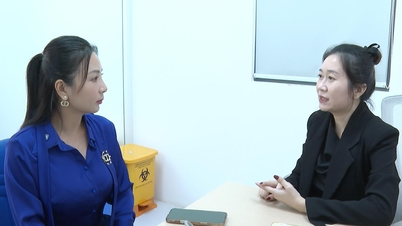 |
| Meals are served to students by teachers at a school in Trang Dai ward when they take them home to look after them after school hours. Photo: Cong Nghia |
Trang Dai Ward currently has 3 public primary schools, but none of them organizes 2 sessions a day because there are not enough classrooms. After finishing the morning class, most of the students are sent to the teachers' homes by their parents for after-school care.
Many schools have not been able to implement boarding schools.
Principal of Trang Dai Primary School Ngo Thi Thu Thuy said: The school has more than 3,100 first graders, which must be divided into two shifts in the morning and afternoon to have enough classrooms. Due to lack of facilities, the school cannot organize two shifts a day, and cannot organize meals for students right at school. Instead, at noon, parents who have time can pick up their children; for parents who are busy with work, they can send their children to the teacher's house. Here, the teachers will serve the children meals, nap, and look after them in the afternoon.
A teacher at Trang Dai Primary School who has been babysitting children after hours for many years said: For each student whose parents ask him to babysit after hours, the fee is 1.3 million VND. When they return to the teacher's house, the children will have a meal, then take a lunch break, and at 2:00 p.m., the teacher will continue to guide them through their lessons. Talking about the daily meal expenses for students, this teacher shared: Because the fee is not much, and there are many other expenses such as: transportation, electricity and water bills, cleaning, and hiring a maid, the cost of meals is only "moderate".
Mr. Lai Viet Dong, a parent whose child attends Phan Dinh Phung Primary School (Long Binh Ward), said: “My husband and I both work as workers in the industrial park, leaving in the morning and returning in the afternoon, so we have to rely on the homeroom teacher to look after our children outside of school hours. In fact, my husband and I do not have the conditions to check the meals at the teacher's house, we can only trust the teacher to leave our children to the teacher, because finding a boarding school in Long Binh Ward is quite difficult.”
With the fee of 1.3 million VND/month/student from parents when taking care of students at home, a teacher at Phan Dinh Phung Primary School shared: In a class of more than 40 students, 30 students are sent by their parents to the teacher's house after or before the main school day. At noon, the children will receive a tray of food including: rice, salty dishes, soup and fruit, the cost of the meal is about 22 thousand VND. Talking about the origin of the food, this teacher said: "When organizing the service of taking care of students after school hours, my family has to hire someone to go to the market and cook. Every day, vegetables and fruits are bought at Long Binh market to process."
According to an official of the Department of Education and Training, after checking the actual situation at schools that have a boarding model, they are quite reassured, some schools even do very well. However, the most worrying thing now is the places where teachers' homes take care of children after school hours. On the surface, the meals served by teachers at home are quite "simple", so it is difficult to have enough nutrients and balanced nutrition, not to mention deeper issues such as the origin of the food, whether the processing method ensures food safety and hygiene or not.
Strengthen inspection to avoid food safety risks
Wards and communes need to strengthen their grasp of the situation of boarding school implementation in their areas, especially those where teachers take care of students after school hours. Providing meals for students must not only be delicious and clean, but also have to be of sufficient quality and nutrition. School boards must strengthen their responsibilities. If any school has the conditions to teach 2 sessions/day and implement boarding school, they must boldly implement it on the basis of open and transparent discussion and consultation to gain high consensus from parents.
Provincial Party Committee Member, Director of Department of Education and Training TRUONG THI KIM HUE
Need to make efforts to implement boarding school
The demand for 2 sessions/day, with boarding schools from parents of students at all levels of education is very high, especially at the primary level. In fact, schools that have organized the 2 sessions/day boarding model are "sought after" by parents so that their children have the opportunity to study, thereby feeling "fully assured".
Ms. Do Thi Van An, a parent at Cao Ba Quat Primary School (in Trang Bom Commune) said: “When the school has boarding schools, it will be very convenient for both parents and students, because we do not have to spend a lot of time taking them to and from school, meals are provided by the school; at the same time, we avoid the risks of student injury, the risk of abuse…”.
While 100% of non-public schools have organized boarding for students from grades 1-12, most public schools are still struggling to find ways to implement the model of studying 2 sessions/day with boarding. Some schools lack space and classrooms, so they can only teach one session/day. Even schools with sufficient conditions, the school board has not dared to implement boarding, because to implement it, it requires collecting money and management is very complicated...
The principal of Nguyen An Ninh Primary School (in Tam Hiep Ward) said: The school does not have a large area, so it is not possible to organize on-site cooking for students. However, considering the parents' needs and the good of the students, the school has organized boarding for students for many years. When organizing, the board of directors and homeroom teachers all work hard because they have to stay at school to take care of the children's meals and sleep. Because the school does not have the conditions to cook on-site for students, it must contract with a catering service company. Exchanges between the school and the company are quite frequent to ensure commitment to quality and food hygiene and safety.
In a recent survey of high schools in 8 border communes by the Department of Education and Training, the number of schools that have implemented boarding activities at school is not much, and even very difficult. These difficulties come from both the school and the parents, in which the school has not ensured the facilities, and on the parents' side, if they let their children participate in boarding at school, they do not have money to contribute, due to difficult economic conditions.
The principal of a school in Loc Tan commune said: The school's facilities were built a long time ago so they have almost completely degraded. The school has a kitchen that can serve meals to students, but because the number of students registering for boarding is not large, organizing meals is not feasible because the income is not enough to cover expenses. The school chose the solution of ordering meals from outside at mealtimes to serve boarding students. If in the future, when the province invests in building schools for border communes; at the same time, there is an additional policy to support meals for students in border communes, the school's implementation of boarding will certainly be more favorable.
Justice
Source: https://baodongnai.com.vn/xa-hoi/202511/dam-bao-an-toan-ve-sinh-thuc-pham-cho-hoc-sinhcon-nhieu-noi-lo-tiem-an-f3a2357/


![[Photo] The road connecting Dong Nai with Ho Chi Minh City is still unfinished after 5 years of construction.](https://vphoto.vietnam.vn/thumb/1200x675/vietnam/resource/IMAGE/2025/11/04/1762241675985_ndo_br_dji-20251104104418-0635-d-resize-1295-jpg.webp)


![[Photo] Ca Mau "struggling" to cope with the highest tide of the year, forecast to exceed alert level 3](https://vphoto.vietnam.vn/thumb/1200x675/vietnam/resource/IMAGE/2025/11/04/1762235371445_ndo_br_trieu-cuong-2-6486-jpg.webp)
![[Photo] Panorama of the Patriotic Emulation Congress of Nhan Dan Newspaper for the period 2025-2030](https://vphoto.vietnam.vn/thumb/1200x675/vietnam/resource/IMAGE/2025/11/04/1762252775462_ndo_br_dhthiduayeuncbaond-6125-jpg.webp)
































































































Comment (0)